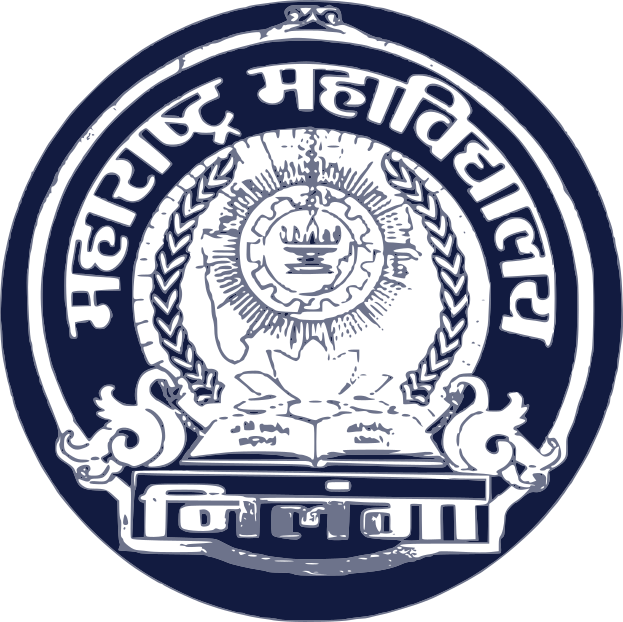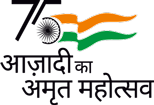Department of Zoology
About the Department: In Maharashtra Mahavidylaya Nilanga B.Sc. programme started in 1985-86 from that date ZOOLOGY department comes in existence. ZOOLOGY students receiving knowledge of various discipline of subjects as well as study of biodiversity by arranging excursion tours and acquiring global placements in various sectors. All the students centered activities are running in the department to make students versatile & to achieve great success piece , Harmony in their life
Many students achieved Set Net JRF from this department & also so many students secured jobs in various private institute. Laboratory work also very important aspect for identification ,Classification of different Animals belongs to various Phylums. Department working till date running all program prescribed by SRTMU Nanded .Department of ZOOLOGY has Working as Educational and Social help center by enabling Empowering the students through knowledge. Our Department is also working to inculcate ethical values, Environment Conversation, Human Value guidelines for sustainable Development and to concrete the nation.
TEACHER’S DURATION IN THE ZOOLOGY DEPARTMENT
| Sr. No | Name of the Faculty | Designation | Date of joining | Experience | Date of Retirement | CV | Photo |
| 1 | Prof.Dr. M.N. Kolpuke | Principal | 10/08/1987 | 35 | 24/08/2025 |  |
|
| 2 | Prof. Dr.D.H.Jadhav | Professor & Head | 01/09/1988 | 35 | 03/04/2025 | Dr. Jadhav sir CV |  |
| 3 | Mr. Reddy V.A | Assistant Professor | 15/07/2018 | 05 | Vishnu Reddy CV | ||
| 4 | Miss. Chaudhri R.S. | Assistant Professor | 18/7/2018 | 05 | Reshma RESUME | ||
| 5 | Miss .Bole S.T. | Assistant Professor | 15/07/2021 | 03 |
Faculty Awards/Achievements /Recognition
| Name of the Faculty | Sr.
No |
Year of the Award | Title Of the Award | Level | Awarded by |
| Prof.Dr. . M.N. Kolpuke | 01 | 2023 | Great Science Teacher Award | ||
| 02 | |||||
| 03 | |||||
| Sr. No. | Name of the Programme | In-take Capacity | Duration | Paper No. | Programme Objectives |
| 1. | B.sc –I year semester -I | 120 | 01Year | Paper –I
Paper-II |
The student will be able to identify and understand comparative anatomical structure of
vertebrate organ systems. The learner will be able to understand the evolution of various organs and systems in the vertebrate body according to its environment. Understand the plasticity of organ systems to adapt to the environment and acquire different novel forms |
| 2. | B.sc –I Year semester -II | 120 | 01 Year | paper- III
Paper- IV Paper-V
|
1. The student will be able to explain the basics processes of vertebrate embryonic development.
2. Ability to describe the various steps in vertebrate development. 3. Identify and explain about the different embryonic structures. 4. Describe the functions of different extra-embryonic structures. 5. Understanding of the Assisted Reproductive Technologies. . |
| 3 | B.sc-II year semester-III | 120 | 01Year | Paper -VI
Paper – VII SEC –I SEC) SECZ –I (A): HAEMATOLOGY |
On successful completion of the course, the students will be able to
1. Understand the chemical structure and functions of various biomolecules 2. Learn the signaling of biomolecules in cell membrane. 3. Understand the correlation between metabolism of different types of biomolecules.
|
| 4 | B,sc-II year semester-IV | 120 | 01 Year | Paper- VIII
Paper-IX Paper-X Paper-XI SEC-II SECZ- II (D): APICULTURE |
1. Monitor their blood pressure and identify blood groups.
2. Understand function and types of heart & circulatory system. 3. Appreciate the basic function of kidney, main function of nerves. 4. Acquire knowledge on the nature and functions of hormones and learn the mechanism of hormone action. 5. Learn the structure and functions of Endocrine glands. 6. Understand the structure, development and function of reproductive organs in human. |
| 5 | B.sc-III year semester-V | 120 | 01 Year | Paper-XII
Paper-XIII SEC- III |
1. Demonstrate knowledge of biotic and abiotic interactions. 2. Express understanding of environmental issues, and inter-relation between different components of an ecosystems. 3. Ability to elaborate about distribution and abundance of organisms. 4. Apply different experimental techniques to study any ecosystem or its components. 5. Describe the relation between structure and function species in environment. 6. Display knowledge of natural resources and pollution management techniques. |
| 6 | B.sc-III year semester-VI | 120 | 01 Year | Paper-XIV
Paper-XV Paper-XVI Paper-XVII SEC-IV |
1. Ability and skill to design and construct a fish farm.
2. Skill to describe and undertake different methods of fish breeding. 3. Describe different food fish species and their capture methods used in India. 4. Elaborate about different fishing craft and gear used in Indian capture fishery. 5. Knowledge of fish diseases and skill to treat sick fish with appropriate techniques. |
PROGRAMMES OFFERED
Courses Offered
| Year | Semester | Titles of the Courses | Course Outcomes |
| B.SC I |
I & II |
Paper-I :Biodiversity of Invertebrates
|
Outcome of the Course:
1.The student will be able to identify and understand the Biodiversity of Chordates. 1. Ability to understand anatomical relation between different vertebrate classes. 2. The learner will be able to understand the economic importance of Chordates. |
| Paper-II : Biodiversity of Chordates | 1. The student will be able to identify and understand comparative anatomical structure of vertebrate organ systems.
2. The learner will be able to understand the evolution of various organs and systems in the vertebrate body according to its environment. 3. Understand the plasticity of organ systems to adapt to the environment and acquire different novel forms. |
||
| Developmental Biology of Vertebrates Section –A
Title of Paper: Paper-III: Comparative Anatomy of Vertebrates |
Outcome of the Course:
1. The student will be able to identify and understand comparative anatomical structure of vertebrate organ systems. 2. The learner will be able to understand the evolution of various organs and systems in the vertebrate body according to its environment. 3. Understand the plasticity of organ systems to adapt to the environment and acquire different novel forms. |
||
| Title of Paper:
Paper- IV : Developmental Biology of Vertebrates
|
Outcomes:
1. Ability to understand the anatomical organization of organs and systems in representative species. 2. Ability to identify and describe structure and functions of different body parts of invertebrates and vertebrates. 3. Students would be able to prepare temporary and permanent mountings of biological material. 4. Students would be able to relate different bones and be able to articulate them to form an skeleton. 5. Students would make observations of organisms in their natural environment and document them. |
||
| B.Sc-II | III & IV | Paper: CCZ- III: Physiology and Biochemistry | Outcome of the Course: On successful completion of the course, the students will be able to
1. Monitor their blood pressure and identify blood groups. 2. Understand function and types of heart & circulatory system. 3. Appreciate the basic function of kidney, main function of nerves. 4. Acquire knowledge on the nature and functions of hormones and learn the mechanism of hormone action. 5. Learn the structure and functions of Endocrine glands. 6. Understand the structure, development and function of reproductive organs in human. Outcome of the Course: On successful completion of the course, the students will be able to 1. Understand the chemical structure and functions 2. of various biomolecules 2. Learn the signaling of biomolecules in cell membrane. 3. Understand the correlation between metabolism of different types of biomolecules. |
| SEC Skill Enhancement Course (SEC) SECZ –I (A): HAEMATOLOGY
SECZ- II (D): APICULTURE Periods: 45 Credits: 02 (Marks: 50)
|
Outcomes :
1. Ability to explain composition and functions of blood. 2. Knowledge about compounds used in processing and storage of blood. Outcomes 1. 1 Ability to understand and describe the life stages and social organization of honey bee species. 2. Ability to correctly explain and perform bee rearing, farming and harvesting practices. 3. Appreciate the economic importance of derivative benefits and byproducts of apiculture. 4. To identify and take remedial measures against the different bee diseases and predators. |
||
| Paper: CCZP- III Section –A & B Title of Paper: Practical Paper XI: Cell Biology, Genetics, Evolutionary Biology and Genetic Engineering (Practical based on P-VIII & IX) Practicals: 32 Credits: 02 (Marks: 50)
Title of Paper: Practical Paper XI: Cell Biology, Genetics, Evolutionary Biology and Genetic Engineering (Practical based on P-VIII & IX) Centre: Date: Batch No.: Session: Marks: 40 Time: 04 Hrs |
Outcomes:
1. Students would be able to prepare temporary squash preparations of onion root tips for mitosis. 2. Demonstrate the genetic traits in Man. 3. Ability to culture Drosophila flies in the laboratory. 4. Ability for mounting of salivary glands of Drosophila larvae. 5. Students are able to understand the outline of Genetic Engineering. 6. Ability to Learn the role of Genetic Engineering in biology. |
||
| B.Sc- III | V & VI | Zoology Semester -V Paper: DSEZ-I; Section –A
Title of Paper: Paper-XII -Ecology & Zoo-geography Periods : 45 Credits: 02 (Marks: 50) I |
Outcomes:
1. Demonstrate knowledge of biotic and abiotic interactions. 2. Express understanding of environmental issues, and inter-relation between different components of an ecosystems. 3. Ability to elaborate about distribution and abundance of organisms. 4. Apply different experimental techniques to study any ecosystem or its components. 5. Describe the relation between structure and function species in environment. 6. Display knowledge of natural resources and pollution management techniques. |
| Semester -V Paper: DSEZ-I; Section –B Title of Paper: Paper-XIIIA -Pisciculture Periods : 45 Credits: 02 (Marks: 50)
|
Outcomes:
1. Ability and skill to design and construct a fish farm. 2. Skill to describe and undertake different methods of fish breeding. 3. Describe different food fish species and their capture methods used in India. 4. Elaborate about different fishing craft and gear used in Indian capture fishery. 5. Knowledge of fish diseases and skill to treat sick fish with appropriate techniques. |
||
| SEC Skill Enhancement Course
Faculty of Science And Technology B.Sc. THIRD Year, Semester – V Skill Enhancement Course SECZ- III (F): VERMICULTURE AND VERMICOMPOSTING Periods: 45 Credits: 02 (Marks: 50) Semester – VI Skill Enhancement Course SECZ –IV (G) : AQUARIUM KEEPING Periods: 45 Credits:02 (Marks:50) |
Outcomes:
1. Knowledge of morphology and biology of earthworms used in vermiculture. 2. Ability and skill of rearing earthworms and using them in vermicomposting. 3. Proper operating of implements and equipment used in vermicomposting. Outcomes: 1. Describe different types of aquariums and raw material used to fabricate them. 2. Ability to properly handle material and accessories for aquarium fabrication and installation. 3. Identify water parameters and adjust them to normal conditions. |
||
| Semester -VI
Paper: DSEZ-II; Section -A Title of Paper: Paper- XIV-Ethology, Biometry and Bioinformatics Periods : 45 Credits: 02 (Marks: 50) |
Outcomes:
1. An appreciation of animal behavior and complexities of ethology. 2. Knowledge of basic concepts and techniques of biometry. 3. Knowledge and skill to apply the techniques statistical methods in biology. 4. Knowledge and understanding of practical use of computers in bioinformatics. 5. An understanding of the use of biological databases in research. |
||
| Semester -VI Paper: DSEZ-II; Section -B Title of Paper: Paper- XV(A)-Aquaculture Periods : 45 Credits: 02 (Marks: 50) | Outcomes:
1. Knowledge and understanding of aquaculture methods, mariculture, and fish processing. 3. Knowledge and skill to use different species of locally available larvivorous fish in vector control. 4. Knowledge and understanding of the role of Government agencies in development of aquaculture. |
||
| Practical Syllabus Paper: DSEZP-I (Based on DSEZ-I; Section-A& DSEZ-II; Section-A) Title of Paper: Paper- XVI -Ecology, Zoo-geography, Ethology, Biometry and Bioinformatics Periods : 15 + 15 Credits: 02 (Marks: 50) | Outcomes:
1. Skill of handling, testing and analysis of water samples. 2. Recognition and description of animal adaptations under different ecological and zoo-geographic conditions. 3. Describe animal responses to different environmental signals. 4. Apply different techniques to gather analyze analyze data using a computer. 5. Browse, search and download information from online biological databases. |
||
| Practical Syllabus Paper: DSEZP-II (Based on DSEZ-I; Section-B& DSEZ-II; Section-B) Title of Paper: Pisciculture and Aquaculture {XVII (A)} Periods : 15 + 15 Credits: 02 (Marks: 50) | Outcomes:
1. Perform fish farm practices, farm management, fish breeding & rearing. 2. Adopt appropriate fish preservation and processing techniques for fish by-products. 3. Ability to identify and describe fish of capture and culture food fish. |
Result
| Year | Enrolled | Appeared | Pass | Fail | Per. |
| 2018-19 | 64 | 64 | 62 | 02 | 96 |
| 2019-20 | 54 | 52 | 52 | 00 | 100 |
| 2020-21 | 103 | 99 | 95 | 04 | 95.95 |
| 2021-22 | 79 | 74 | 70 | 04 | 95.56 |
| 2022-23 | 59 | 59 | 57 | 02 | 94.96 |
Students’ Achievements/ Merits
| Merit of the Department- 2019-20 | |||||||||
| Year | Students Name | P.N.
|
P.N.
|
P.N.
|
P.N.
|
P.N.
|
P.N.
|
Total
Marks |
|
| XII | XIII | XIV | XV | XVI | XVII | Marks | |||
| Third
Year |
First | Tabbu Firoz Pathan | 38 | 42 | 42 | 40 | 49 | 49 | 260 |
| Second | Anjum Ara Shaikh | 35 | 35 | 43 | 41 | 48 | 48 | 250 | |
| Third | Shital Tukaram Chirke | 37 | 38 | 39 | 38 | 48 | 48 | 248 | |
| Merit of the Department – 2020-21 | |||||||||
| Year | Students Name | P.N.
|
P.N. | P.N.
|
P.N.
|
P.N.
|
P.N.
|
Total
Marks |
|
| XII | XIII | XIV | XV | XVI | XVII | Marks | |||
| Third
Year |
First | Poonam Tanaji Doke | 34 | 38 | 36 | 35 | 50 | 50 | 261 |
| Second | Nikhil Bhale |
42 |
40 | 42 | 41 | 49 | 50 |
264 |
|
| Third | Shital Sudam Pethkar | 39 | 35 | 37 | 32 | 50 | 50 | 243 | |
| Merit of the Department – 2021-22 | |||||||||
| Year | Students Name | P.N. | P.N. | P.N.
|
P.N.
|
P.N.
|
P.N.
|
Total
Marks |
|
| XII | XIII | XIV | XV | XVI | XVII | Marks | |||
| Third
Year |
First | Laxmi Gurunath Pandharpure | 46 | 46 | 39 | 39 | 48 | 47 | 265 |
| Second | Swpna Gavandgave | 46 | 44 | 38 | 39 | 47 | 46 | 260 | |
| Third | Nikita Tanaji Gaundgave | 44 | 44 | 46 | 33 | 47 | 46 | 260 | |
Merit of the Department – 2022-23
| Year | Students Name | P.N | P.N. | P.N.
|
P.N.
|
P.N.
|
P.N.
|
Total
Marks |
|
| XII | XIII | XIV | XV | XVI | XVII | Marks | |||
| B.Sc.III | First | Rachna Rajendra Hajare | 47
|
45 | 48 | 48 | 50 | 50 | 288 |
| Second | Anjali Sadanand Narhare | 43
|
40 | 44 | 44 | 47 | 48 | 266 | |
| Third | Rutuja Laxyman Mashalkar | 31
|
42 | 43 | 41 | 46 | 48 | 251 | |
Prajakta Sanjeev Kawale
Best Practices of the Department
| Sr. No. | Title of the Best Practice | Photos |
| 1 | Education Tour | 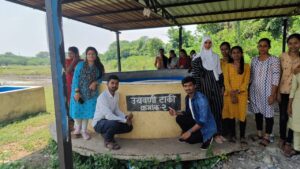 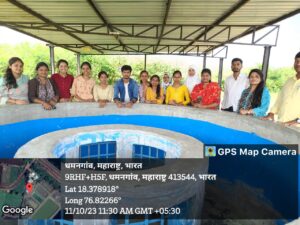 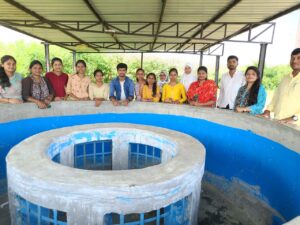 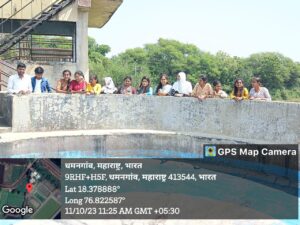 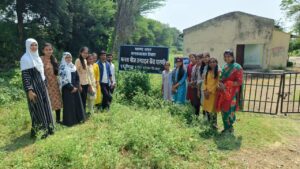 |
| 2 | ICT Class | 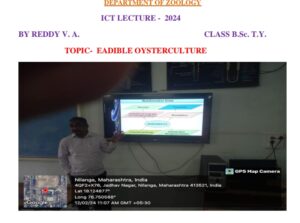 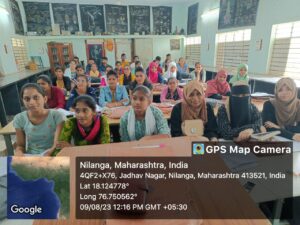 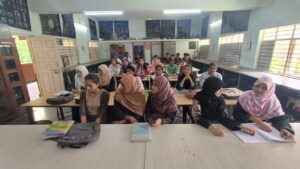 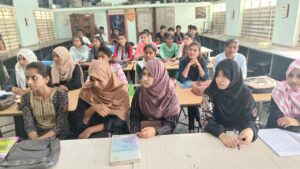 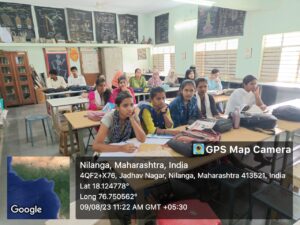 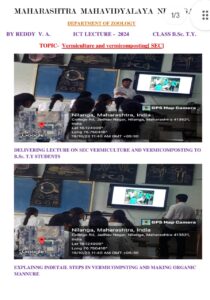 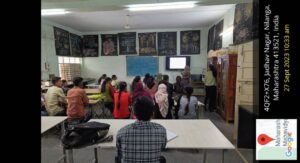 |
| 2 | Poster Presentation | 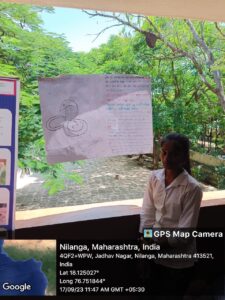 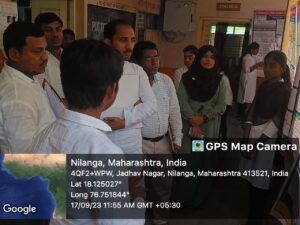 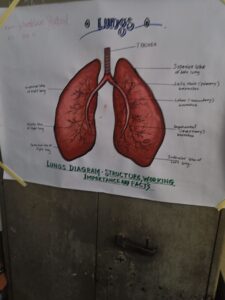 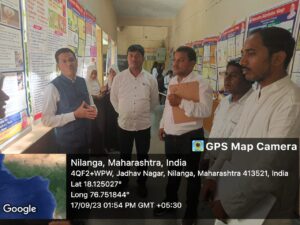 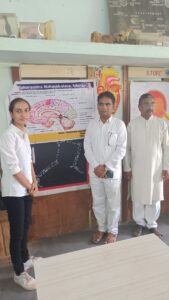 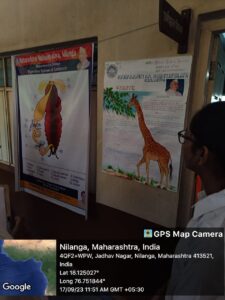 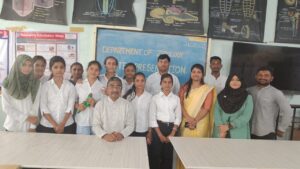 |
| National Science Day | 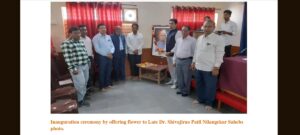 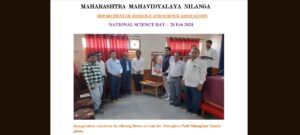 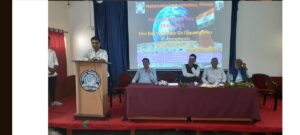 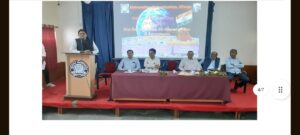 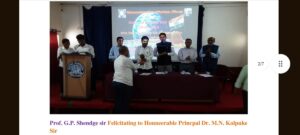 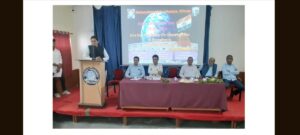 |
|
| Webinar | ICT WEBINAR 2-1 | |
| Wide life Conversation Week | zoology wild life week | |
| Blood Group Detection | 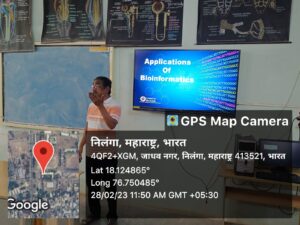 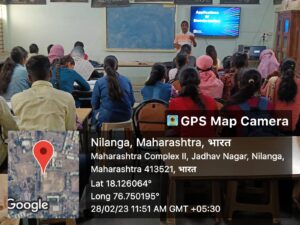 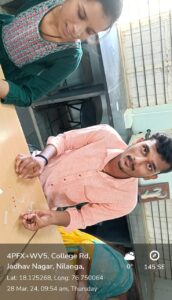 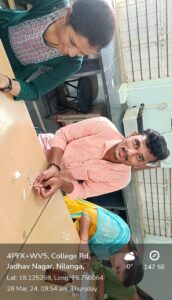 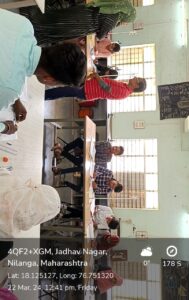 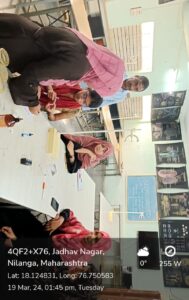 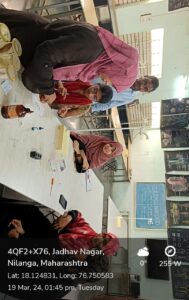 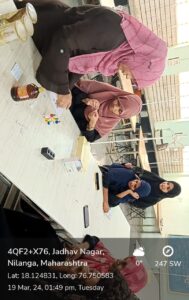 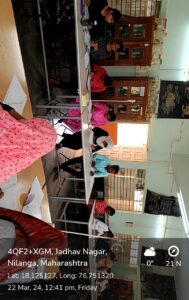 |
Notable Alumni
| Sr. No. | Name of the Alumni | Present Designation |
| 1. | Prof. Dr.Vitthal R. More | Professor at Government College Aurangabad.
J.D. S.R.T.M.U .Nanded |
| 2. | Prof.Dr.Vasant Jadhav | Professor at Annasheb Vaghire College Otur Dist.Pune |
| 3. | Dr.Balasheb Patil | Junior lecturer in Zoology Ajim Jr. College Ausa |
| 4. | Prof. Sanjay Birajdar | Junior lecturer Ajim Jr. College Ausa |
| 5. | Prof.Jayesh N. Mare | Junior lecturer Maharashtra Jr. College Aurad. |
| 6 | Adv. Vasudev V.Kulkarni | Additional District And Session Court Nilanga. |
| 7 | Prof Maruti Kamble | Junior lecturer Anandmuni Jr. College Kelgaon. |
| 8 | Judge. Ajit Mare | Nagpur Bench. |
| 9 | Mr. Datta Shahir | H.M. Dr. Shivajirao Patil Vidhyalaya Ansarwada |
| 10 | Rachna Rajendra Hajare | Achieved With 94% University First Rank in 2023, Gold medal Zoology
|
| 11 | Sonali Pawar | Net AIR Rank 30 2017-2018 |
| 12 | Saliya Patel | Net |
